Go to the Time/CNN article by Richard Corliss at
http://www.time.com/time/arts/article/0,8599,1819466,00.html
and read one of the best reviews of Will Smith and the movie HANCOCK.
Thanks,
Preston
A blog for lovers of the printed word (novels, short stories, poems--the Ing so to speak), popular film, politics, and casinos (the Bling).
Sunday, July 6, 2008
Hancock Should Have Been a Sequel
Okay,
I saw HANCOCK.
Excellent story!!!
The movie, however, will be a disappointment to some.
**spoiler warning****spoiler warning****spoiler warning****spoiler warning****spoiler warning****spoiler warning****spoiler warning****spoiler warning**
The story--A superhero with a major attitude problem hires a publicist to change his image--but when he meets the publicist's wife, the hero realizes why he feels so much emptiness inside--he and the publicist's wife are the only beings of their kind left on earth--in fact, they are husband and wife, and have been for 5000 years.
This is an excellent story, and it would make an excellent plot for a novel or an art film, or a film by M. Night Shylaman--Think of the movie UNBREAKABLE, another favorite of mine because of its excellent story, but a disappointment to many, many fans of super hero movies because of its lack of action and its cerebral rather than physical climax.
Now, HANCOCK, unlike UNBREAKABLE, does have plenty of action, but it is ultimately a tale of the sacrifices we make for love (see CASABLACNCA), rather than a superhero flick.
You can see how the second half of the film focuses, not on the capture of a major super villain (none of which exists in the movie, by the way--imagine a superhero movie with no super villian), but on how Hancock and his Misses will solve their dilemma.
Finally, this movie, or rather this excellent "story," would have been better as a sequel. Think about it. First, you make the real film HANCOCK--and let him duke it out with a major supervillian. Then in the sequel, you have him find his lost love and go into his orgin a little bit.
**Spoiler warning over****Spoiler warning over****Spoiler warning over**
I, personally, enjoyed pondering some of the issues raised in the film about love, race, history, the role of heroes in society, but when you look at this movie, don't think SPIDERMAN--think CITY OF ANGELS (for plot) and think MY SUPER EX-GIRLFRIEND (for comedic stylings).
On another note, Will Smith is amazingly appealing as the wise-cracking, farting, drunken, A--hole, jerk of a hero that the film opens up with. He has sooooo many great lines you will be splitting your sides with laughter. That performance alone is worth the price of admission.
Thanks,
Preston
I saw HANCOCK.
Excellent story!!!
The movie, however, will be a disappointment to some.
**spoiler warning****spoiler warning****spoiler warning****spoiler warning****spoiler warning****spoiler warning****spoiler warning****spoiler warning**
The story--A superhero with a major attitude problem hires a publicist to change his image--but when he meets the publicist's wife, the hero realizes why he feels so much emptiness inside--he and the publicist's wife are the only beings of their kind left on earth--in fact, they are husband and wife, and have been for 5000 years.
This is an excellent story, and it would make an excellent plot for a novel or an art film, or a film by M. Night Shylaman--Think of the movie UNBREAKABLE, another favorite of mine because of its excellent story, but a disappointment to many, many fans of super hero movies because of its lack of action and its cerebral rather than physical climax.
Now, HANCOCK, unlike UNBREAKABLE, does have plenty of action, but it is ultimately a tale of the sacrifices we make for love (see CASABLACNCA), rather than a superhero flick.
You can see how the second half of the film focuses, not on the capture of a major super villain (none of which exists in the movie, by the way--imagine a superhero movie with no super villian), but on how Hancock and his Misses will solve their dilemma.
Finally, this movie, or rather this excellent "story," would have been better as a sequel. Think about it. First, you make the real film HANCOCK--and let him duke it out with a major supervillian. Then in the sequel, you have him find his lost love and go into his orgin a little bit.
**Spoiler warning over****Spoiler warning over****Spoiler warning over**
I, personally, enjoyed pondering some of the issues raised in the film about love, race, history, the role of heroes in society, but when you look at this movie, don't think SPIDERMAN--think CITY OF ANGELS (for plot) and think MY SUPER EX-GIRLFRIEND (for comedic stylings).
On another note, Will Smith is amazingly appealing as the wise-cracking, farting, drunken, A--hole, jerk of a hero that the film opens up with. He has sooooo many great lines you will be splitting your sides with laughter. That performance alone is worth the price of admission.
Thanks,
Preston
A Direct Appeal
Thanks to all of you who have emailed me questions and comments. I like the direction this blog has taken, and I owe it all to you.
Now I'd like to make a direct appeal: please go out and purchase a copy of my book ALL OR NOTHING and write a review for me on Amazon.com. It really is a great book. I promise you will enjoy it.
The book has received rave reviews from the New York Times, Publishers Weekly, Kirkus Review, and Library Journal among others.
Get your copy today! Support living, breathing writers!
Thanks,
Preston
______________________________
New York Times: "As with Frederick and Steven Barthelme's disarming gambling memoir, Double Down (1999), the chief virtue of All or Nothing is its facility in enlightening nonbelievers, showing how this addiction follows recognizable patterns of rush and crash, but with a twist—the buzz is in the process, not the result. 'That's what people don't understand about gamblers,' P explains. 'We gamble to gamble. We play to play. We don't play to win.'
"As a cartographer of autodegradation, Allen takes his place on a continuum that begins, perhaps, with Dostoyevsky’s “Gambler,” courses through Malcolm Lowry’s “Under the Volcano,” William S. Burroughs’s “Junky,” the collected works of Charles Bukowski and Hubert Selby Jr., and persists in countless novels and (occasionally fabricated) memoirs of our puritanical, therapized present. Like Dostoyevsky, Allen colorfully evokes the gambling milieu — the chained (mis)fortunes of the players, their vanities and grotesqueries, their quasi-philosophical ruminations on chance. Like Burroughs, he is a dispassionate chronicler of the addict’s daily ritual, neither glorifying nor vilifying the matter at hand."
Library Journal: "Told without preaching or moralizing, the facts of P's life express volumes on the destructive power of gambling. This is strongly recommended and deserves a wide audience; an excellent choice for book discussion groups."
Publishers Weekly: "The well-written novel takes the reader on a chaotic ride as P chases, finds and loses fast, easy money. Allen reveals how addiction annihilates its victims and shows that winning isn't always so different from losing."
Kirkus Review: "A gambler's hands and heart perpetually tremble in this raw story of addiction.
"We gamble to gamble. We play to play. We don't play to win." Right there, P, desperado narrator of this crash-'n'-burn novella, sums up the madness. A black man in Miami, P has graduated from youthful nonchalance (a '79 Buick Electra 225) to married-with-a-kid pseudo-stability, driving a school bus in the shadow of the Biltmore. He lives large enough to afford two wide-screen TVs, but the wife wants more. Or so he rationalizes, as he hits the open-all-night Indian casinos, "controlling" his jones with a daily ATM maximum of $1,000. Low enough to rob the family piggy bank for slot-machine fodder, he sinks yet further, praying that his allergic 11-year-old eat forbidden strawberries—which will send him into a coma, from which he'll emerge with the winning formula for Cash 3 (the kid's supposedly psychic when he's sick). All street smarts and inside skinny, the book gives readers a contact high that zooms to full rush when P scores $160,000 on one lucky machine ("God is the God of Ping-ping," he exults, as the coins flood out). The loot's enough to make the small-timer turn pro, as he heads, flush, to Vegas to cash in. But in Sin City, karmic payback awaits. Swanky hookers, underworld "professors" deeply schooled in sure-fire systems to beat the house, manic trips to the CashMyCheck store for funds to fuel the ferocious need—Allen's brilliant at conveying the hothouse atmosphere of hell-bent gaming.
Fun time in the Inferno."
Now I'd like to make a direct appeal: please go out and purchase a copy of my book ALL OR NOTHING and write a review for me on Amazon.com. It really is a great book. I promise you will enjoy it.
The book has received rave reviews from the New York Times, Publishers Weekly, Kirkus Review, and Library Journal among others.
Get your copy today! Support living, breathing writers!
Thanks,
Preston
______________________________
New York Times: "As with Frederick and Steven Barthelme's disarming gambling memoir, Double Down (1999), the chief virtue of All or Nothing is its facility in enlightening nonbelievers, showing how this addiction follows recognizable patterns of rush and crash, but with a twist—the buzz is in the process, not the result. 'That's what people don't understand about gamblers,' P explains. 'We gamble to gamble. We play to play. We don't play to win.'
"As a cartographer of autodegradation, Allen takes his place on a continuum that begins, perhaps, with Dostoyevsky’s “Gambler,” courses through Malcolm Lowry’s “Under the Volcano,” William S. Burroughs’s “Junky,” the collected works of Charles Bukowski and Hubert Selby Jr., and persists in countless novels and (occasionally fabricated) memoirs of our puritanical, therapized present. Like Dostoyevsky, Allen colorfully evokes the gambling milieu — the chained (mis)fortunes of the players, their vanities and grotesqueries, their quasi-philosophical ruminations on chance. Like Burroughs, he is a dispassionate chronicler of the addict’s daily ritual, neither glorifying nor vilifying the matter at hand."
Library Journal: "Told without preaching or moralizing, the facts of P's life express volumes on the destructive power of gambling. This is strongly recommended and deserves a wide audience; an excellent choice for book discussion groups."
Publishers Weekly: "The well-written novel takes the reader on a chaotic ride as P chases, finds and loses fast, easy money. Allen reveals how addiction annihilates its victims and shows that winning isn't always so different from losing."
Kirkus Review: "A gambler's hands and heart perpetually tremble in this raw story of addiction.
"We gamble to gamble. We play to play. We don't play to win." Right there, P, desperado narrator of this crash-'n'-burn novella, sums up the madness. A black man in Miami, P has graduated from youthful nonchalance (a '79 Buick Electra 225) to married-with-a-kid pseudo-stability, driving a school bus in the shadow of the Biltmore. He lives large enough to afford two wide-screen TVs, but the wife wants more. Or so he rationalizes, as he hits the open-all-night Indian casinos, "controlling" his jones with a daily ATM maximum of $1,000. Low enough to rob the family piggy bank for slot-machine fodder, he sinks yet further, praying that his allergic 11-year-old eat forbidden strawberries—which will send him into a coma, from which he'll emerge with the winning formula for Cash 3 (the kid's supposedly psychic when he's sick). All street smarts and inside skinny, the book gives readers a contact high that zooms to full rush when P scores $160,000 on one lucky machine ("God is the God of Ping-ping," he exults, as the coins flood out). The loot's enough to make the small-timer turn pro, as he heads, flush, to Vegas to cash in. But in Sin City, karmic payback awaits. Swanky hookers, underworld "professors" deeply schooled in sure-fire systems to beat the house, manic trips to the CashMyCheck store for funds to fuel the ferocious need—Allen's brilliant at conveying the hothouse atmosphere of hell-bent gaming.
Fun time in the Inferno."
Zero Chances of Winning
Hahahahahahaha.
Why am I not surprised? Once you are hooked, they can treat you like crap and you keep coming back.
Preston
__________________________
Scratch-Off Lottery Tickets Under Fire
By Dennis Cauchon,
USA Today
Posted: 2008-06-30 09:30:18
Filed Under: Nation News
(June 30) -- Feeling lucky today?
Then don't buy a $20 scratch-off ticket for the New Jersey Lottery's "$1,000,000 Explosion" game.
Your chances of winning the $1 million top prize are Z-E-R-O.
The six top prizes were awarded months ago, but the $20 tickets are still on sale. The best prize available today is $10,000.
State lotteries are coming under renewed criticism for selling scratch-off tickets after the top prizes have been given away. The latest challenge comes from a professor who says he intends to sue Virginia for allegedly selling $20 million a year in lottery tickets that had no top prize available.
About half of the 42 states that have lotteries — including Florida, New Jersey, Michigan and Tennessee — keep selling tickets after the top prizes are gone. The states say the practice is fair because lottery tickets and websites disclose the practice. Also, other prizes are available.
Sales of scratch-off lottery tickets have soared since the introduction of high-priced tickets designed to have huge jackpots — $1 million or more is common — that can be won instantly.
The "$1,000,000 Explosion" was New Jersey's first $20 ticket and very popular, said lottery spokesman Dominick DeMarco. Most tickets are gone, although the game won't end until July 21.
California, New York, Massachusetts and other states now end scratch-off games when top prizes are gone. The changes often followed lawsuits that were unsuccessful but generated bad publicity. The lawsuits "sure changed the way lotteries do business," says attorney Rob Carey, who filed suits in California, Colorado, Arizona and Washington.
In August 2007, Washington and Lee University business professor Scott Hoover bought $5 tickets for a game called "Beginners Luck" in Virginia. Later, he learned the top prize was awarded in July. Using public records, Hoover calculated that the state sold about $20 million annually for three years in tickets when a top prize wasn't available. He says the state should compensate these players.
"They were promising $75,000 prizes that weren't there," says John Fishwick, Hoover's lawyer.
Virginia Lottery executive director Paula Otto says the lottery as of July 2007 now ends scratch-off games after the last top prize is awarded.
Copyright 2008 USA TODAY, a division of Gannett Co. Inc. All Rights Reserved.
2008-06-30 07:52:10
Why am I not surprised? Once you are hooked, they can treat you like crap and you keep coming back.
Preston
__________________________
Scratch-Off Lottery Tickets Under Fire
By Dennis Cauchon,
USA Today
Posted: 2008-06-30 09:30:18
Filed Under: Nation News
(June 30) -- Feeling lucky today?
Then don't buy a $20 scratch-off ticket for the New Jersey Lottery's "$1,000,000 Explosion" game.
Your chances of winning the $1 million top prize are Z-E-R-O.
The six top prizes were awarded months ago, but the $20 tickets are still on sale. The best prize available today is $10,000.
State lotteries are coming under renewed criticism for selling scratch-off tickets after the top prizes have been given away. The latest challenge comes from a professor who says he intends to sue Virginia for allegedly selling $20 million a year in lottery tickets that had no top prize available.
About half of the 42 states that have lotteries — including Florida, New Jersey, Michigan and Tennessee — keep selling tickets after the top prizes are gone. The states say the practice is fair because lottery tickets and websites disclose the practice. Also, other prizes are available.
Sales of scratch-off lottery tickets have soared since the introduction of high-priced tickets designed to have huge jackpots — $1 million or more is common — that can be won instantly.
The "$1,000,000 Explosion" was New Jersey's first $20 ticket and very popular, said lottery spokesman Dominick DeMarco. Most tickets are gone, although the game won't end until July 21.
California, New York, Massachusetts and other states now end scratch-off games when top prizes are gone. The changes often followed lawsuits that were unsuccessful but generated bad publicity. The lawsuits "sure changed the way lotteries do business," says attorney Rob Carey, who filed suits in California, Colorado, Arizona and Washington.
In August 2007, Washington and Lee University business professor Scott Hoover bought $5 tickets for a game called "Beginners Luck" in Virginia. Later, he learned the top prize was awarded in July. Using public records, Hoover calculated that the state sold about $20 million annually for three years in tickets when a top prize wasn't available. He says the state should compensate these players.
"They were promising $75,000 prizes that weren't there," says John Fishwick, Hoover's lawyer.
Virginia Lottery executive director Paula Otto says the lottery as of July 2007 now ends scratch-off games after the last top prize is awarded.
Copyright 2008 USA TODAY, a division of Gannett Co. Inc. All Rights Reserved.
2008-06-30 07:52:10
Labels:
crime,
gambler,
gamblers anonymous,
gambling,
luck,
quitting gambling
Subscribe to:
Posts (Atom)
Lipshitz 6

Reading T Cooper for Christmas
Click Here to Purchase Lipshitz 6
Punk Blood
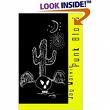
Jay Marvin
Click Here to Purchase Punk Blood
Breath, Eyes, Memory

Anonymous Rex
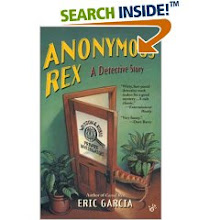
Reading Eric Garcia for Christmas
Click Here to Purchase Anonymous Rex
Vinegar Hill
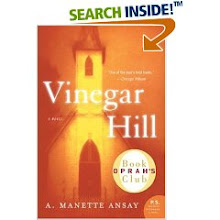
Reading A. Manette Ansay for Christmas
Click Here to Purchase Vinegar Hill
Nicotine Dreams

Reading Katie Cunningham for Christmas
Click Here to Purchase Nicotine Dreams
Junot Diaz
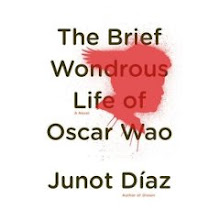
Pulitzer Prize Winner!!!
Click Here to Purchase The Brief Wondrous Life of Oscar Wao
Edwige Danticat

New Year's Reading
Click Here to Purchase Brother I"m Dying
Greed
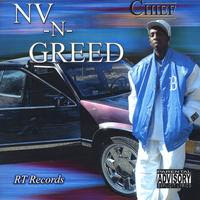
This Brother Is Scary Good
Sweet Music
One More Chance
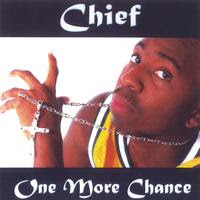
The genius Is At It Again/The Rapper CHIEF aka Sherwin Allen
Sandrine's Letter
Check out Sandrine's Letter To Tomorrow. You will like it, I insist.
Sandrine's Link
Cool Sites
- Akashic Books
- All or Nothing (My Other Blog)
- Asili The Journal
- Best Gamblling News Site
- Black Star Review
- Book Remarks
- Booktour.com
- Carolina Wren Press
- Click Here for Some Pretty Good Writing Contests
- Dedra Johnson
- Enrico Theoc
- Felicia Luna Lemus
- Florida Book Review
- Foreword Magazine
- Gambling Is Linked to Suicide
- Gambling Is Not Linked to Suicide
- Gaming Law Review
- Gene Durnell's The Thinking Journalist
- Gene Durnell's The Thinking Journalist
- Geoffrey Philp's Blog
- Get Chief's CDs on CD Baby
- Getting Past Gambling
- Gonzalo Barr's Blog
- Good Reads
- Hallema's Homepage
- Help With Gambling Addiction
- Jeremy Shipp's Website
- John Dufresne's Blog
- Leonard Nash Homepage
- Links to Seminole Casinos in Florida
- Martha Frankel's Homepage
- Michael A. Gonzales
- Miss Snark/ An Agent Gives Great Publishing Advice
- More Addiction Help
- No Gambling.com
- Pat MacEnulty
- ScrewIowa.com
- St. Louis Rams, The Greatest Show on Turf
- Suicide reference library
- T Cooper
- University of Florida
- Vicki Hendricks
- Walter Jacobs's Blog
- Writers Who Read
- Writing with Celia

All or Nothing

Editorial Reviews of All or Nothing
New York Times--". . . a cartographer of autodegradation . . . Like Dostoyevsky, Allen colorfully evokes the gambling milieu — the chained (mis)fortunes of the players, their vanities and grotesqueries, their quasi-philosophical ruminations on chance. Like Burroughs, he is a dispassionate chronicler of the addict’s daily ritual, neither glorifying nor vilifying the matter at hand."
Florida Book Review--". . . Allen examines the flaming abyss compulsive gambling burns in its victims’ guts, self-esteem and bank accounts, the desperate, myopic immediacy it incites, the self-destructive need it feeds on, the families and relationships it destroys. For with gamblers, it really is all or nothing. Usually nothing. Take it from a reviewer who’s been there. Allen is right on the money here."
Foreword Magazine--"Not shame, not assault, not even murder is enough reason to stop. Allen’s second novel, All or Nothing, is funny, relentless, haunting, and highly readable. P’s inner dialogues illuminate the grubby tragedy of addiction, and his actions speak for the train wreck that is gambling."
Library Journal--"Told without preaching or moralizing, the facts of P's life express volumes on the destructive power of gambling. This is strongly recommended and deserves a wide audience; an excellent choice for book discussion groups."—Lisa Rohrbaugh, East Palestine Memorial P.L., OH
LEXIS-NEXIS--"By day, P drives a school bus in Miami. But his vocation? He's a gambler who craves every opportunity to steal a few hours to play the numbers, the lottery, at the Indian casinos. Allen has a narrative voice as compelling as feeding the slots is to P." Betsy Willeford is a Miami-based freelance book reviewer. November 4, 2007
Publisher’s Weekly--"Allen’s dark and insightful novel depicts narrator P’s sobering descent into his gambling addiction . . . The well-written novel takes the reader on a chaotic ride as P chases, finds and loses fast, easy money. Allen (Churchboys and Other Sinners) reveals how addiction annihilates its victims and shows that winning isn’t always so different from losing."
Kirkus Review--"We gamble to gamble. We play to play. We don't play to win." Right there, P, desperado narrator of this crash-'n'-burn novella, sums up the madness. A black man in Miami, P has graduated from youthful nonchalance (a '79 Buick Electra 225) to married-with-a-kid pseudo-stability, driving a school bus in the shadow of the Biltmore. He lives large enough to afford two wide-screen TVs, but the wife wants more. Or so he rationalizes, as he hits the open-all-night Indian casinos, "controlling" his jones with a daily ATM maximum of $1,000. Low enough to rob the family piggy bank for slot-machine fodder, he sinks yet further, praying that his allergic 11-year-old eat forbidden strawberries—which will send him into a coma, from which he'll emerge with the winning formula for Cash 3 (the kid's supposedly psychic when he's sick). All street smarts and inside skinny, the book gives readers a contact high that zooms to full rush when P scores $160,000 on one lucky machine ("God is the God of Ping-ping," he exults, as the coins flood out). The loot's enough to make the small-timer turn pro, as he heads, flush, to Vegas to cash in. But in Sin City, karmic payback awaits. Swanky hookers, underworld "professors" deeply schooled in sure-fire systems to beat the house, manic trips to the CashMyCheck store for funds to fuel the ferocious need—Allen's brilliant at conveying the hothouse atmosphere of hell-bent gaming. Fun time in the Inferno.
Florida Book Review--". . . Allen examines the flaming abyss compulsive gambling burns in its victims’ guts, self-esteem and bank accounts, the desperate, myopic immediacy it incites, the self-destructive need it feeds on, the families and relationships it destroys. For with gamblers, it really is all or nothing. Usually nothing. Take it from a reviewer who’s been there. Allen is right on the money here."
Foreword Magazine--"Not shame, not assault, not even murder is enough reason to stop. Allen’s second novel, All or Nothing, is funny, relentless, haunting, and highly readable. P’s inner dialogues illuminate the grubby tragedy of addiction, and his actions speak for the train wreck that is gambling."
Library Journal--"Told without preaching or moralizing, the facts of P's life express volumes on the destructive power of gambling. This is strongly recommended and deserves a wide audience; an excellent choice for book discussion groups."—Lisa Rohrbaugh, East Palestine Memorial P.L., OH
LEXIS-NEXIS--"By day, P drives a school bus in Miami. But his vocation? He's a gambler who craves every opportunity to steal a few hours to play the numbers, the lottery, at the Indian casinos. Allen has a narrative voice as compelling as feeding the slots is to P." Betsy Willeford is a Miami-based freelance book reviewer. November 4, 2007
Publisher’s Weekly--"Allen’s dark and insightful novel depicts narrator P’s sobering descent into his gambling addiction . . . The well-written novel takes the reader on a chaotic ride as P chases, finds and loses fast, easy money. Allen (Churchboys and Other Sinners) reveals how addiction annihilates its victims and shows that winning isn’t always so different from losing."
Kirkus Review--"We gamble to gamble. We play to play. We don't play to win." Right there, P, desperado narrator of this crash-'n'-burn novella, sums up the madness. A black man in Miami, P has graduated from youthful nonchalance (a '79 Buick Electra 225) to married-with-a-kid pseudo-stability, driving a school bus in the shadow of the Biltmore. He lives large enough to afford two wide-screen TVs, but the wife wants more. Or so he rationalizes, as he hits the open-all-night Indian casinos, "controlling" his jones with a daily ATM maximum of $1,000. Low enough to rob the family piggy bank for slot-machine fodder, he sinks yet further, praying that his allergic 11-year-old eat forbidden strawberries—which will send him into a coma, from which he'll emerge with the winning formula for Cash 3 (the kid's supposedly psychic when he's sick). All street smarts and inside skinny, the book gives readers a contact high that zooms to full rush when P scores $160,000 on one lucky machine ("God is the God of Ping-ping," he exults, as the coins flood out). The loot's enough to make the small-timer turn pro, as he heads, flush, to Vegas to cash in. But in Sin City, karmic payback awaits. Swanky hookers, underworld "professors" deeply schooled in sure-fire systems to beat the house, manic trips to the CashMyCheck store for funds to fuel the ferocious need—Allen's brilliant at conveying the hothouse atmosphere of hell-bent gaming. Fun time in the Inferno.
At Books and Books
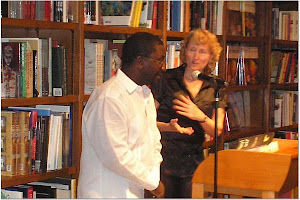
Me And Vicki at Our Reading
Bio
Preston L. Allen is the recipient of a State of Florida Individual Artist Fellowship in Literature and the Sonja H. Stone Prize in Fiction for his short story collection Churchboys and Other Sinners (Carolina Wren Press 2003). His works have appeared in numerous publications including The Seattle Review, The Crab Orchard Review, Asili, Drum Voices, and Gulfstream Magazine; and he has been anthologized in Here We Are: An Anthology of South Florida Writers, Brown Sugar: A Collection of Erotic Black Fiction, Miami Noir, and the forthcoming Las Vegas Noir. His fourth novel, All Or Nothing, chronicles the life of a small-time gambler who finally hits it big. Preston Allen teaches English and Creative Writing in Miami, Florida.